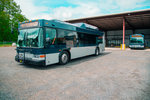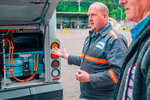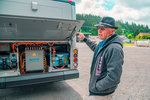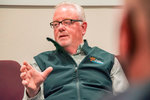







A pair of refurbished electric buses arrived at Twin Transit’s depot last week, and riders could see the 35-foot clean and quiet transit vehicles in use later this summer.
The buses were transported from Riverside, California-based Complete Coach Works. A representative with the company has been busy showing Twin Transit drivers, employees and local fire authorities the ins and outs of the rechargeable vehicles.
The move is part of the transit authority’s goal to take its entire fleet carbon-neutral by 2030.
Twin Transit Executive Director Joe Clark said testing on routes could begin as early as next week and the buses could be running real route tests by June 3, which lines up with the grand opening of the new Mellen Street e-Transit Station.
Both buses began their life as 2004 Gillig buses but were refurbished and converted into electric buses by Complete Coach Works, which is selling them to the transit authority.
“Typically, the disposal process for a bus was to either scrap it or resell it on a third-party market for pennies on the dollar. In this effort, we’re taking diesel buses and really giving them a new life,” said Clark, describing Complete Coach Works’ program. “I think it’s really a great program from that standpoint that it’s taking already-built equipment and converting it into something that’s very useful.”
Both buses have an average range of about 150 miles. Twin Transit plans to extend that range thanks to the new e-Station, which when completed will include a contactless induction charging pad that buses can use while they’re parked.
The new buses will likely first appear on the city routes where they work most efficiently going on varied distances averaging 25 to 30 mph. Twin Transit also plans on outfitting the new buses with WiFi for riders.
Jacques Gagne, director of customer relations at Complete Coach Works, said applying electric buses to the relative flatness of the Twin Cities is a good match, especially with the area’s climate and the number of stops the buses will drive past.
Tim Palmateer, fleet manager at Twin Transit, said bringing new electric tech to their hub is exciting, especially as they learn about the refurbishing process.
As Gagne has explained the workings of the buses over the last week, Palmateer notes it hasn’t been that big of a departure from working on diesel buses.
“Our guys are eager to learn. Jacques’s done a good job in informing us on the process and the safety precautions we should take when looking at the vehicles and inspecting them, and I feel that we’re getting tooled up and ready to launch these buses here shortly,” Palmateer said.
The refurbished buses cost Twin Transit about $800,000 each, which is somewhere around $50,000 more than what you would normally pay for a diesel bus, Clark said. Twin Transit is anticipating fairly significant cost savings in operating electric buses, which will save them on the extra cost throughout the 12-year lifecycle on a single bus.
As demand lowers electric bus costs over the years, and as Twin Transit and other transportation businesses and municipalities install electric infrastructure, there could be extra savings by being well-prepared in the decades to come.
“You’re not changing oil, you’re not doing those kinds of things,” Clark said. “Yeah, we still have tires and wiper blades and things like that, but a lot of the preventative maintenance schedules that you would see in a typical diesel or gasoline shop are eliminated through this technology.”
Andrea Culletto, director of Twin Transit’s community relations, said they’re also planning a collaboration with Centralia College’s diesel program to teach electric vehicle technology to students.
“It’s just a pipeline that we’re trying to establish so that people getting into this industry can get the training they need to go work on these technologies, which will hopefully proliferate into more job opportunities in the future as more and more companies and organizations bring on these technologies,” Culletto said.
Clark said Complete Coach Works has been really helpful in allowing them to create that collaboration and sustain renewable technology use in the community.
Local firefighters, who have scheduled meetings with Gagne to go over safety and operations, have also been really responsive, Clark said.
Gagne said there is a little more thought that goes into, for example, extinguishing a fire on an electric bus than on a diesel bus, largely because there’s no fuel. Gagne also shows them the high-voltage cabling and the location of the battery during those meetings.
Twin Transit on Wednesday gave The Chronicle a tour of the two vehicles. One electric bus was quieter than a new gasoline car as it drove out from a vehicle bay. There was also no smell or byproduct emitted.
Gagne said the bus is so quiet that an alarm-announcer comes on the vehicle’s loudspeakers to notify pedestrians when it’s approaching a turn.
The average lithium ion battery in the bus lasts about five years, Clark said, but Twin Transit is hoping to extend that to nearly twice as long by bump charging the buses with the induction pads and implementing fuel-efficient driving techniques and other efficiencies.
Twin Transit is also working to secure a pair of hydrogen buses next year in conjunction with the rollout of the state’s first hydrogen refueling station in Chehalis.